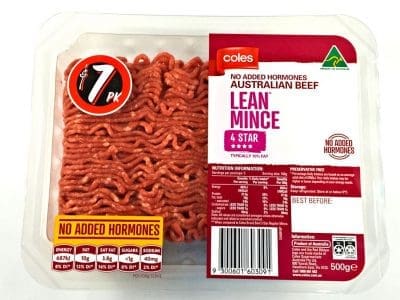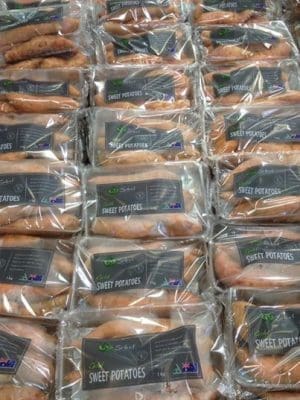WITH increased emphasis being seen on sustainability performance throughout the food supply chain, supermarket retailers are starting to focus on packaging solutions which provide greener credentials for their chilled meat products.
Australian consumers are now following a trend that’s been clearly evident in Europe for five years or more, pushing-back against excessively and unnecessarily -packaged food products (see references below).

Click on image for a larger view
The Australian Institute of Packaging recently told its members that Coles Supermarkets has begun to offer its own-label brand of lean beef mince in a revolutionary new plant-based packaging material.
The Australian-developed Plantic Technologies product combines the best of recyclable materials (polyethylene terephthalate/PET) and Plantic’s bio-based ultra-high barrier material, which also increases the shelf-life of packaged meats. The technology recently earned major recognition in Dupont’s International Packaging Innovation awards.
The Plantic product is a multi-layer film converted from thin layers of PET over a core layer of renewably-sourced, high-barrier plant-based Plantic HP, which provides the oxygen and gas barrier, while the PET layer provides a moisture and water vapour barrier.
Unlike conventional multi-layer films, the Plantic R package material is soluble. The HP barrier layer is washed away, and according to the manufacturer, biodegrades in the recycling process, while the PET layer is recovered.
In addition to being renewable and recyclable, the Plantic R packaging requires about half the energy to produce than traditional fossil fuel plastics.
Shelf-life advantage
“This next-generation material is a boon to Australia’s beef industry, as it affords dramatically increased shelf-life of packaged meats,” the AIP report said. “That increase in shelf-life gives consumers greater confidence that the product will be fresher at the time of purchase.”
According to Mintel research, freshness is the leading attribute consumers seek in food packaging.
“Brands using Plantic can build eco-equity among consumers, who increasingly expect big companies to do more to protect and preserve the environment than they could as individuals,” AIP said.
“Coles has exploited a show-and-tell design scheme on the pack,” AIM said.
“One half of the film lidding is clear, which allows shoppers to visually inspect the beef product, while the other half has very succinct on-pack messaging. That communication includes a ‘No added hormones’ claim, which according to Mintel Global New Products Database, is one of the top five fastest growing claims in the category.
“Also included is an easy-to-read and understand visual graphic that provides directions for proper disposing of the tray and film, both of which are recyclable.”
Growing awareness about wasteful packaging
Australian consumers are now following a trend that’s been clearly evident in Europe for five years or more, pushing-back against excessive-packaging in food products.
Social media recently lit up when a consumer criticised Woolworths for over-packaging its sweet potatoes, attracting a chorus of support.
Under the photo published left, a Newcastle shopper posted:
“Why??? Woolworths, we, your customers, don’t want this. Our planet doesn’t need it. Sweet potatoes can go from your shelf to my trolley to my kitchen without ever needing to touch a plastic bag, let alone a plastic tray as well!!”
Within days, her post attracted 96,000 likes, 6700 comments and 14,000 shares.
A Woolworths social media representative responded by saying that “the plastic packing was designed to preserve the product throughout the supply chain”, and that the company “made efforts to use packaging as efficiently as possible”, pointing out that “many of our packaged produce lines are also available in loose format.”
But this did not stop other consumers from weighing in and criticising the supermarket’s explanation as ‘spin.’ “If you also supply sweet potatoes in loose format and they survive fine, then there is no reason to wrap them in plastic, and then plastic again,” a shopper wrote.
“We’re pleased to have several organic produce suppliers who have recently adopted recycled packaging,” a Woolworths social media manager wrote. “We’ve also eliminated polystyrene trays from our produce organics supply network, converting to compostable trays or recyclable plastic.”
Excess packaging has been a sensitive issue within the European supermarket sector for most of the past decade, and major retailers now go to considerable lengths to reduce or eliminate packaging, where possible.
Technology earns international award
The technical and consumer-facing elements of the Plantic packaging innovation have not gone unnoticed by the global packaging community.
Coles’ use of the Plantic R packaging innovation was judged a ‘Diamond Finalist’ in last month’s 2017 DuPont Awards for Packaging Innovation. This global, independently-judged competition cited the packaging for its excellence in technical achievement, responsible packaging, and enhanced user experience.
The DuPont competition is generally considered the most prestigious packaging competition in the world, honouring brands, technologies, and processes that demonstrate major advancements in packaging technology that address the diverse and particular needs of consumers.
Click here to view a short video recognising Plantic’s tectnology in the Dupont Packaging Innovation awards:
- Beef Central first wrote about the Plantic packaging technology in this 2012 article.

